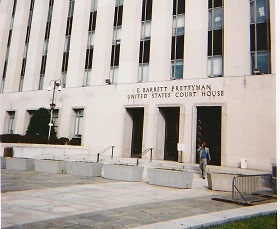Court Upholds FCC Nixing of Dish-Related AWS-3 Credits
The smarter way to stay on top of the multichannel video marketplace. Sign up below.
You are now subscribed
Your newsletter sign-up was successful

A federal court has upheld the FCC's determination that Dish had de facto control over AWS-3 winning bidders SNR and Northstar.
The FCC denied designated entity (DE) bidding credits to the companies--some $3.3 billion worth--which would have lowered the bid to $10 billion, after which the companies said it could not pay for all of the licenses, paying full price for some and turning back others, which the FCC allowed them to do.
The AWS-3 auction raised over $40 billion and paid for the FirstNet broadband emergency network in the process.
"Under the totality of the circumstances, we believe that the FCC acted reasonably and consistently with its Wireless Bureau’s decisions when it held that DISH had de facto control over SNR and Northstar," wrote Judge Cornelia Pillard in the decision, which was rendered by a three-judge panel comprising Judges Pillard and Janice Rogers Brown and senior Circuit Judge Stephen F. Williams.
But the U.S. Court of Appeals for the District of Columbia panel also found that the FCC did not give those companies sufficient notice that, if their relationship cost them the credits, the FCC would not give them a change to cure that de facto control.
"Because the FCC did not give clear notice that such an opportunity would be denied, we conclude that an opportunity for petitioner to renegotiate their agreements with DISH provides the appropriate remedy here," the court said.
The court remanded the matter back to the FCC saying it needed to give those companies a chance to negotiate a "cure" of that control, which presumably could mean reinstating the credits.
Dish is ready to pitch in. ""We are pleased this has been referred back to the FCC," the company said in a statement. "We look forward, along with NorthStar and SNR, to working with the FCC to address any concerns they may have.”
The FCC had argued against providing a cure, saying it would disincentivize compliance since companies could just seek the credit and haggle post-auction. The court disagreed, saying "nothing in our decision requires the FCC to permit a cure. That choice lies with the FCC. But if the very opportunity to seek one is to be foreclosed, applicants must have clear, advance notice to that effect."
“Today’s D.C. Circuit decision explains in painstaking detail why the Commission reasonably determined that DISH abused a program designed to help small businesses," said Tina Pelkey, press secretary to FCC Chairman Ajit Pai. "This is an important victory for American taxpayers. In the AWS-3 auction, the two entities claiming over $3 billion in taxpayer-funded discounts were not independent small businesses, but rather under the control of DISH. Going forward, we need to make sure that this program is available only to legitimate small businesses that actually control their own destinies.”
The smarter way to stay on top of the multichannel video marketplace. Sign up below.
Dish had put up most of the money for the two to bid $10 billion on wireless spectrum licenses in the AWS-3 wireless spectrum auction. The licenses were actually worth $13.3 billion, but SNR and Northstar sought designated entity bidding credits as diverse owners. The FCC denied that credit--after they had already bid--due to Dish's investment and plans to run the network.
The court signaled that if the companies extricate themselves sufficiently from Dish to the FCC's satisfaction, they could qualify for the $3.3 billion break and reclaim those licenses. If not, the FCC will have to re-auction that $3.3 billion worth of spectrum.
Harold Feld of Public Knowledge, which filed an amicus brief in support of essentially what the court concluded--that the FCC had the authority to deny the credits, but should have given Dish and the companies the chance to cure the problem--was, not surprisingly, pleased with the decision.
"I'm pleased the court agreed with our analysis," Feld told Multichannel News/B&C. "As we noted in our amicus, the DE credit put licenses in the hands of competitors, and into constituted the single largest win of FCC licenses by minority-owned businesses (both SNR and Northstar are minority owned as defined by the Commission).
"Second, we hope that the FCC will move expeditiously to negotiate with DISH to provide adequate independence for the DEs and put the spectrum into productive use -- especially on behalf of a potential new entrant into terrestrial wireless. Whatever personal feelings then-Commissioner Pai and others may have expressed about DISH's conduct previously, the court has made it clear that DISH is entitled to the opportunity to cure the defects the FCC found in its DE agreements. To the extent people feel DISH unfairly exploited a loophole, the FCC has long since closed the loophole. It's time to put this matter to rest and get the spectrum out as quickly as possible."
Contributing editor John Eggerton has been an editor and/or writer on media regulation, legislation and policy for over four decades, including covering the FCC, FTC, Congress, the major media trade associations, and the federal courts. In addition to Multichannel News and Broadcasting + Cable, his work has appeared in Radio World, TV Technology, TV Fax, This Week in Consumer Electronics, Variety and the Encyclopedia Britannica.

